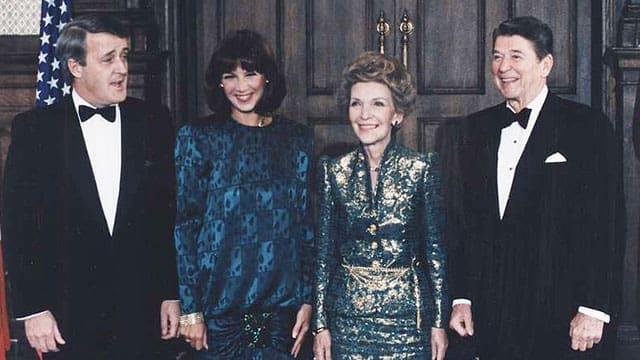Mulroney emerges as a foreign policy leader in recent academic study
 Retrospectively rating political leaders is an academic cottage industry that invariably generates interesting news copy, the ranking of American presidents being a particular case in point. Mind you, the results of such exercises should always be approached with caution.
Retrospectively rating political leaders is an academic cottage industry that invariably generates interesting news copy, the ranking of American presidents being a particular case in point. Mind you, the results of such exercises should always be approached with caution.
Because they’re human, rankers – even “expert” ones – have their own ideological priors. And putting those policy preferences to the side isn’t necessarily easy, especially in politically polarised times. Thus a healthy scepticism on the reader’s part is always in order.
That said, last year’s Statesmen, Strategists & Diplomats is an interesting examination of the impact each Canadian prime minister has had in the area of foreign policy. Edited by Patrice Ducil, it draws on the analysis of 15 Canadian academics in an attempt to ascertain who was successful, who wasn’t, and what personal characteristics made the difference.
The methodology consisted of addressing 10 separate questions and, using a five-point scale, rating the performance of each prime minister under each question. A score of five signified very effective, one was very ineffective, and the points in between represented intermediate levels of performance. As for the questions, they covered the whole range from ability to manage the foreign policy bureaucracy to promoting Canadian interests abroad to leaving a sustainable legacy.
 From left, Brian and Mila Mulroney, Nancy and Ronald Reagan |
| Related Stories |
| Brian Mulroney’s Catholic faith forged his identity
|
| Brian Mulroney and Ronald Reagan are together again
|
So, who were the top performers?
Averaging the ratings over all categories, pride of place is given to two figures from the early to mid-20th century – Louis St. Laurent and William Lyon Mackenzie King. Both men were prime minister during tumultuous international times, a period when Canada – although never a major power – was a bigger global player than it is today.
St. Laurent scores an average of 4.34 out of a maximum of 5.0 – or, if you prefer, an 87 percent mark. His period in office (1948 to 1957) encompassed events like the beginning of the Cold War, the founding of NATO, and the Korean War.
King is a whisker behind at 4.33 (also 87 percent) based on his second period as prime minister. Running from 1935 to 1948, it was marked by the lead-up to the Second World War, the war itself and its immediate aftermath.
Given the stage on which St. Laurent and King were playing, their relative prominence is perhaps to be expected. But who comes next might surprise you. With an average score of 4.05 (81 percent), Brian Mulroney takes third place, edging out Lester Pearson’s 4.01 (80 percent).
Mulroney’s foreign policy accomplishments chiefly revolve around repairing Canada’s relations with the United States, leading to the Free Trade Agreement that subsequently morphed into the broader North American Free Trade Agreement (NAFTA). Although fiercely criticized by the opposition at the time, NAFTA is now cherished virtually across the board. And there was also the Air Quality Agreement, designed to combat the problem of acid rain.
But there was more to Mulroney than bilateral relations with the Americans.
He was also active on the multilateral front, playing an important role in co-ordinating international pressure on South Africa to end apartheid and move to majority rule. Nelson Mandela both recognized and appreciated that.
One of Mulroney’s dominant characteristics was a strong belief in the importance of interpersonal diplomacy, which he pursued with a blend of energy, charm, confidence and – when the chips were down – toughness. This enabled him to develop strong relationships with a number of world leaders, and thus be taken seriously by them.
The most important of these was the bond formed with Ronald Reagan. Although it didn’t endear Mulroney to broad swathes of Canadian opinion, it allowed him to successfully seek Reagan’s personal intervention on Canada’s behalf when disagreement over the dispute resolution mechanism threatened to torpedo the free trade negotiations.
Mulroney also recognized the importance of tone.
Prime ministers have often viewed international relations as a “licence to sermonize regarding other countries,” something that tends to play well with domestic audiences, especially when the target of the sermon is the U.S. Mulroney didn’t approach Canadian-American relations that way. In his view, the relationship between the two countries was Canada’s single most important one, and thus shouldn’t be impaired with unproductive irritations.
In addition to answering the specific 10 questions, study contributors were invited to address an open one: Among Canadian prime ministers, could they identify a foreign policy superstar? Three names came to the fore – St. Laurent, Mulroney, and Pearson.
Being the hypersensitive guy that he was, when his popularity plunged during his second term, Mulroney took to asserting that history’s longer-term perspective would vindicate him.
Turns out he was right.
Troy Media columnist Pat Murphy casts a history buff’s eye at the goings-on in our world. Never cynical – well, perhaps a little bit.
For interview requests, click here.
The opinions expressed by our columnists and contributors are theirs alone and do not inherently or expressly reflect the views of our publication.
© Troy Media
Troy Media is an editorial content provider to media outlets and its own hosted community news outlets across Canada.

